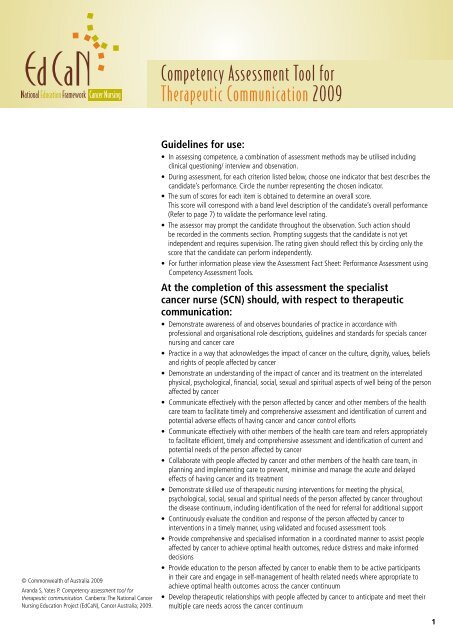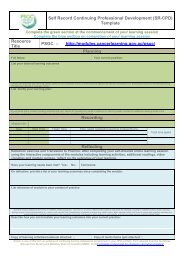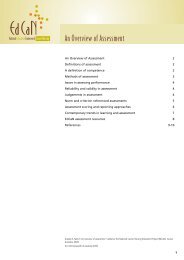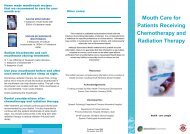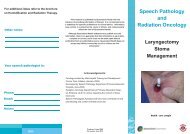Competency Assessment Tool for Therapeutic ... - Cancer Learning
Competency Assessment Tool for Therapeutic ... - Cancer Learning
Competency Assessment Tool for Therapeutic ... - Cancer Learning
Create successful ePaper yourself
Turn your PDF publications into a flip-book with our unique Google optimized e-Paper software.
<strong>Competency</strong> Asse ssment <strong>Tool</strong> <strong>for</strong><br />
<strong>Therapeutic</strong> Communication 2009<br />
© Commonwealth of Australia 2009<br />
Aranda S, Yates P. <strong>Competency</strong> assessment tool <strong>for</strong><br />
therapeutic communication. Canberra: The National <strong>Cancer</strong><br />
Nursing Education Project (EdCaN), <strong>Cancer</strong> Australia; 2009.<br />
Guidelines <strong>for</strong> use:<br />
• In assessing competence, a combination of assessment methods may be utilised including<br />
clinical questioning/ interview and observation.<br />
• During assessment, <strong>for</strong> each criterion listed below, choose one indicator that best describes the<br />
candidate’s per<strong>for</strong>mance. Circle the number representing the chosen indicator.<br />
• The sum of scores <strong>for</strong> each item is obtained to determine an overall score.<br />
This score will correspond with a band level description of the candidate’s overall per<strong>for</strong>mance<br />
(Refer to page 7) to validate the per<strong>for</strong>mance level rating.<br />
• The assessor may prompt the candidate throughout the observation. Such action should<br />
be recorded in the comments section. Prompting suggests that the candidate is not yet<br />
independent and requires supervision. The rating given should reflect this by circling only the<br />
score that the candidate can per<strong>for</strong>m independently.<br />
• For further in<strong>for</strong>mation please view the <strong>Assessment</strong> Fact Sheet: Per<strong>for</strong>mance <strong>Assessment</strong> using<br />
<strong>Competency</strong> <strong>Assessment</strong> <strong>Tool</strong>s.<br />
At the completion of this assessment the specialist<br />
cancer nurse (SCN) should, with respect to therapeutic<br />
communication:<br />
• Demonstrate awareness of and observes boundaries of practice in accordance with<br />
professional and organisational role descriptions, guidelines and standards <strong>for</strong> specials cancer<br />
nursing and cancer care<br />
• Practice in a way that acknowledges the impact of cancer on the culture, dignity, values, beliefs<br />
and rights of people affected by cancer<br />
• Demonstrate an understanding of the impact of cancer and its treatment on the interrelated<br />
physical, psychological, financial, social, sexual and spiritual aspects of well being of the person<br />
affected by cancer<br />
• Communicate effectively with the person affected by cancer and other members of the health<br />
care team to facilitate timely and comprehensive assessment and identification of current and<br />
potential adverse effects of having cancer and cancer control ef<strong>for</strong>ts<br />
• Communicate effectively with other members of the health care team and refers appropriately<br />
to facilitate efficient, timely and comprehensive assessment and identification of current and<br />
potential needs of the person affected by cancer<br />
• Collaborate with people affected by cancer and other members of the health care team, in<br />
planning and implementing care to prevent, minimise and manage the acute and delayed<br />
effects of having cancer and its treatment<br />
• Demonstrate skilled use of therapeutic nursing interventions <strong>for</strong> meeting the physical,<br />
psychological, social, sexual and spiritual needs of the person affected by cancer throughout<br />
the disease continuum, including identification of the need <strong>for</strong> referral <strong>for</strong> additional support<br />
• Continuously evaluate the condition and response of the person affected by cancer to<br />
interventions in a timely manner, using validated and focused assessment tools<br />
• Provide comprehensive and specialised in<strong>for</strong>mation in a coordinated manner to assist people<br />
affected by cancer to achieve optimal health outcomes, reduce distress and make in<strong>for</strong>med<br />
decisions<br />
• Provide education to the person affected by cancer to enable them to be active participants<br />
in their care and engage in self-management of health related needs where appropriate to<br />
achieve optimal health outcomes across the cancer continuum<br />
• Develop therapeutic relationships with people affected by cancer to anticipate and meet their<br />
multiple care needs across the cancer continuum
<strong>Competency</strong> Domain: Professional practice<br />
This domain comprises competencies that reflect the Specialist <strong>Cancer</strong> Nurses (SCN) ability to develop professionally, participate effectively in clinical<br />
governance and influence cancer control ef<strong>for</strong>ts at the systems level.<br />
Criteria Indicator Comments<br />
1.1 Abides by legislation, guidelines and<br />
professional standards relevant to their<br />
scope of practice, i.e. confidentiality, privacy<br />
legislation or working with interpreters<br />
guidelines<br />
1.2 Explains interventions with individual to<br />
obtain verbal consent <strong>for</strong> interventions, i.e.<br />
referrals<br />
1.3 Completes the requirements <strong>for</strong><br />
reporting and documenting communication<br />
and interventions, i.e. referrals<br />
0 Does not identify legislation, guidelines<br />
and professional standards relevant to<br />
communication<br />
1 Practice reflects recall of local policy and<br />
procedure relevant to communication<br />
2 Practice and rationale reflects appreciation<br />
of local policy, legislation, guidelines<br />
and professional standards relevant to<br />
communication<br />
0 Consent not obtained<br />
1 Describes procedures, explores the sensory<br />
and procedural elements of procedures,<br />
consent obtained<br />
2 In obtaining consent, acknowledges the<br />
rights of people affected by cancer OR acts<br />
as advocate <strong>for</strong> individual with regard to<br />
consent issues<br />
0 Reporting and documentation incomplete<br />
1 Practice reflects recall of local policy <strong>for</strong><br />
documenting and reporting communication<br />
2 In accordance with local policy, documents<br />
and reports communication in a timely,<br />
objective and accurate means, reports<br />
significant outcomes where appropriate,<br />
able to effectively articulate reason <strong>for</strong><br />
referrals
<strong>Competency</strong> Domain: Critical thinking and analysis<br />
This domain comprises competencies that reflect the SCNs ability to practice within an evidence-based framework, participate in ongoing<br />
professional development, ensure optimal standards of cancer care and lead ongoing development of cancer nursing.<br />
Criteria Indicator Comments<br />
2.1 Demonstrates an understanding of the<br />
impact of cancer and its treatment on the<br />
wellbeing of the person affected by cancer<br />
and the role of communication in care<br />
2.2 Utilises screening or assessment tools<br />
to assess impact of cancer and treatment<br />
on the wellbeing of the person affected by<br />
cancer<br />
2.3 Commitment to learning is evident<br />
in understanding of the principles of<br />
therapeutic communication<br />
0 Understanding not demonstrated<br />
1 Able to list the various physical,<br />
psychological, financial, social, sexual and<br />
spiritual impacts of cancer and treatment<br />
2 Anticipates with specificity to diagnosis and<br />
treatment the likely impacts of cancer on<br />
the interrelated aspects of the individual,<br />
critiques care of these aspects against<br />
established benchmarks, standards and<br />
guidelines, and appreciates the role of<br />
communication in assessing/ responding to<br />
individual concerns<br />
0 Awareness of screening/ assessment tools<br />
not demonstrated<br />
1 Practice reflects recall of local policy<br />
regarding screening/ assessment tools<br />
2 Describes the indications <strong>for</strong> screening and<br />
assessment tools, appraises the use of an<br />
appropriate assessment tool<br />
0 Commitment to learning not evident<br />
1 Practice and rationale reflects understanding<br />
of evidence-based guidelines such as<br />
the ‘Clinical practice guidelines <strong>for</strong> the<br />
psychosocial care of adults with cancer’<br />
2 Incorporates principles of therapeutic<br />
communication in interactions with people<br />
affected by cancer, identifies key evidence<br />
guiding communication skills, reports<br />
on new advances in relevant fields and<br />
demonstrates the facility to critically review<br />
own per<strong>for</strong>mance
<strong>Competency</strong> Domain: Provision and coordination of care<br />
Provision and coordination of care relates to coordination, organisation and provision of nursing care. It includes the assessment, planning,<br />
implementation, and evaluation of care <strong>for</strong> people affected by cancer, and consists of four dimensions including:<br />
• Disease and treatment related care<br />
• Supportive care<br />
• Coordinated care<br />
• In<strong>for</strong>mation provision and education<br />
Criteria Indicator Comments<br />
3.1 Selects and prepares an appropriate<br />
environment to promote therapeutic<br />
interaction<br />
3.2 Assesses individual’s desire <strong>for</strong> someone<br />
to be present during communication<br />
3.3 Uses appropriate (to individual, age and<br />
culture) verbal and non verbal behaviour<br />
3.4 Uses appropriate questioning styles to<br />
facilitate therapeutic communication<br />
0 Does not consider environment<br />
1 Promotes privacy, arranges <strong>for</strong> interruptions<br />
to be minimised<br />
2 Arranges private, uninterrupted environment<br />
that promotes eye contact, touch and<br />
equality (if culturally appropriate)<br />
0 Does not consider need<br />
OR<br />
0 Invites relative/ friend to be involved<br />
without consultation with individual<br />
1 Ensures individual’s needs are assessed,<br />
provides support if desired<br />
2 Anticipates and is sensitive to the impact of<br />
potentially embarrassing topics<br />
0 Makes assumptions about cultural needs, is<br />
ethnocentric<br />
1 Anticipates that cultural sensitivity is<br />
required with regard to use of touch, eye<br />
contact and use of interpreters<br />
2 Assesses <strong>for</strong> cultural diversity and is guided<br />
by individual with regard to touch and<br />
eye contact. Asks permission to address<br />
individual by name and discuss certain<br />
topics. Initiates interpreter resource<br />
0 Consideration to question type not apparent<br />
1 Uses mostly closed questions<br />
2 Demonstrates the use of a combination of<br />
questioning styles including opening, open<br />
directive, leading and closed questions to<br />
elicit in<strong>for</strong>mation or concerns
Criteria Indicator Comments<br />
3.5 Expresses empathy<br />
3.6 Actively listens<br />
3.7 Encourages expression of feelings<br />
3.8 Avoids medical jargon<br />
3.9 Conveys important in<strong>for</strong>mation<br />
3.10 Checks understanding<br />
0 Empathy not demonstrated<br />
OR<br />
0 Responses are confused with sympathy<br />
1 Provides practical support eg. Offers facial<br />
tissues<br />
2 Acknowledges individual’s feelings as<br />
valid and demonstrates appreciation of a<br />
individual’s point of view<br />
0 Listening not demonstrated<br />
1 Awkward or artificial application of active<br />
listening techniques, eg. leaning <strong>for</strong>ward,<br />
nodding<br />
2 Confidently utilises verbal and behavioural<br />
techniques of active listening to<br />
communicate attention to and engagement<br />
with individual, demonstrates genuine<br />
interest.<br />
0 Blocks expression of feelings<br />
1 Asks individual about feelings<br />
2 Provides individual with adequate time to<br />
discuss feelings, encourages dialogue with<br />
further questions<br />
0 Overuse of jargon observed<br />
1 Occasionally uses jargon<br />
2 Explains concepts in lay terms, uses<br />
language appropriate to age and culture<br />
0 Not demonstrated<br />
1 Uses repetition, provides written materials<br />
2 Employs strategies to promote recall<br />
including primacy, stresses importance,<br />
simplification, categorisation and specificity<br />
0 Understanding not assessed, assumptions<br />
made about understanding or inaccurate<br />
interpretation of dialogue between nurse<br />
and individual<br />
1 Awkward techniques employed<br />
2 Uses a variety of strategies to check<br />
accuracy of understanding by all parties
Criteria Indicator Comments<br />
3.11 Assesses <strong>for</strong> issues including distress/<br />
anxiety/\<br />
3.12 Responds to issue appropriately and<br />
sensitively<br />
0 Issues not assessed<br />
1 Awkward techniques employed<br />
2 Evidence-based communication strategies<br />
utilized including scanning, screening<br />
questions and normalization<br />
0 Blocks dialogue that may involve issues that<br />
are embarrassing, sensitive or difficult to<br />
respond to<br />
1 Awkward techniques employed, indicates<br />
concern about individual, provides practical<br />
solutions, makes referrals<br />
2 Evidence-based communication strategies<br />
utilized including appropriate use of<br />
silence, waiting until tears subside, touch,<br />
normalisation, emphasising effective<br />
treatments, negotiates referral<br />
<strong>Competency</strong> Domain: Collaborative and therapeutic practice<br />
This domain comprises competencies reflecting the SCNs ability to develop effective collaborative relationships with people affected by cancer that<br />
will assist to maximise health outcomes, and establish a collaborative approach to working effectively as part of a multidisciplinary team across the<br />
care continuum. These competencies include recognition of the critical interdependence between the roles of the SCN, other health professionals<br />
and organisations and the establishment of partnerships with people affected by cancer to maximise outcomes.<br />
Criteria Indicator Comments<br />
4.1 Effectively communicates with the<br />
multidisciplinary team<br />
0 Communication is limited with the<br />
multidisciplinary team (MDT)<br />
1 Is familiar with local practice <strong>for</strong> referral<br />
2 Confident in interactions with MDT,<br />
facilitates timely involvement of other team<br />
members in care<br />
Criteria and indicators adapted from: National Breast <strong>Cancer</strong> Centre & National <strong>Cancer</strong> Control Initiative (2003) Clinical practice guidelines <strong>for</strong> the<br />
psychosocial care of adults with cancer, National Breast <strong>Cancer</strong> Centre, Camperdown, NSW.
Band Level De scriptors<br />
Per<strong>for</strong>mance Level Interpretation Range<br />
COMPETENT<br />
Established competence as specialist cancer<br />
nurse<br />
COMPETENT<br />
Beginning competence as specialist cancer<br />
nurse<br />
NOT YET COMPETENT<br />
Complies with legislation relevant to cancer care. Evaluates<br />
and appraises care against evidence-based recommendations.<br />
Is cognisant of individual’s age, culture, specific condition and<br />
interconnected needs. Per<strong>for</strong>ms comprehensive and ongoing<br />
assessments. Confident and independent in interactions with<br />
individual, carers and multidisciplinary team. Communication<br />
style masters a variety of verbal and non verbal styles,<br />
empathy, active listening skills, facilitates the expression of<br />
feelings, promotes recall, assesses <strong>for</strong> psychological distress<br />
and responds to issues effectively. Acts as an advocate.<br />
Documents and reports across the care continuum. Has<br />
a sound knowledge of the underpinning principles of<br />
therapeutic communication and is abreast of new advances in<br />
the field.<br />
Identifies and follows standard policy requirements with<br />
some specificity to individual or context. Appreciates need<br />
<strong>for</strong> age/culturally appropriate interactions. Identifies evident<br />
issues and makes referrals. Is at ease in communication with<br />
individual, carers and multidisciplinary team but requires<br />
occasional prompts to address embarrassing, sensitive and<br />
difficult issues. Fluency with evidence-based communication<br />
strategies evolving.<br />
Knowledge of local policy and rationales <strong>for</strong> practice limited<br />
to recall. Limited focus on task or individual. Interacts<br />
awkwardly. Requires continuous directions or prompts to<br />
address psychosocial needs of individual. Communication style<br />
is ethnocentric. Use of active listening skills not dependable.<br />
31 – 38<br />
19 – 30<br />
0 – 18
<strong>Therapeutic</strong> Communication<br />
Record of <strong>Competency</strong> Asse ssment<br />
Candidate’s Name:<br />
Date of assessment:<br />
Total Score:<br />
Assessor’s comments/ suggested areas <strong>for</strong> improvement:<br />
(Circle appropriate score range)<br />
Per<strong>for</strong>mance Level Interpretation Range<br />
COMPETENT<br />
Established competence<br />
as specialist cancer nurse<br />
Complies with legislation relevant to cancer care. Evaluates and appraises care<br />
against evidence-based recommendations. Is cognisant of individual’s age, culture,<br />
specific condition and interconnected needs. Per<strong>for</strong>ms comprehensive and ongoing<br />
assessments. Confident and independent in interactions with individual, carers and<br />
multidisciplinary team. Communication style masters a variety of verbal and non<br />
verbal styles, empathy, active listening skills, facilitates the expression of feelings,<br />
promotes recall, assesses <strong>for</strong> psychological distress and responds to issues effectively.<br />
Acts as an advocate. Documents and reports across the care continuum. Has a<br />
sound knowledge of the underpinning principles of therapeutic communication and is<br />
abreast of new advances in the field.<br />
31 – 38<br />
COMPETENT<br />
Beginning competence as<br />
specialist cancer nurse<br />
Identifies and follows standard policy requirements with some specificity to<br />
individual or context. Appreciates need <strong>for</strong> age/culturally appropriate interactions.<br />
Identifies evident issues and makes referrals. Is at ease in communication with<br />
individual, carers and multidisciplinary team but requires occasional prompts to<br />
address embarrassing, sensitive and difficult issues. Fluency with evidence- based<br />
communication strategies evolving.<br />
19 – 30<br />
NOT YET COMPETENT<br />
Knowledge of local policy and rationales <strong>for</strong> practice limited to recall. Limited focus<br />
on task or individual. Interacts awkwardly. Requires continuous directions or prompts<br />
to address psychosocial needs of patient. Communication style is ethnocentric.<br />
Use of active listening skills not dependable.<br />
0 – 18<br />
Candidate’s Signature:<br />
Assessor’s Name:<br />
Assessor’s Signature


